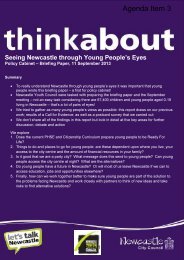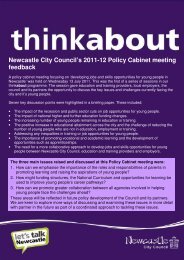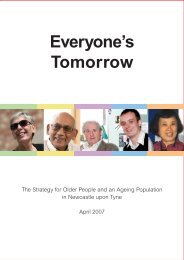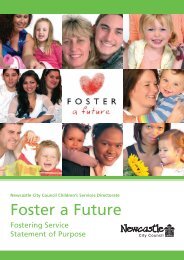NEWCASTLE'S MUSICAL HERITAGE AN INTRODUCTION By ...
NEWCASTLE'S MUSICAL HERITAGE AN INTRODUCTION By ...
NEWCASTLE'S MUSICAL HERITAGE AN INTRODUCTION By ...
Create successful ePaper yourself
Turn your PDF publications into a flip-book with our unique Google optimized e-Paper software.
My pockets low and taxes high,<br />
Ah! I could sit me down to cry;<br />
But why despair The times may mend,<br />
Our loyalty shall us befriend.<br />
Propitious fortune yet may smile<br />
On fair Britannia’s sea girt isle.<br />
Then poverty shall take her flight,<br />
And we will sing by day and night,<br />
God save great George our king,<br />
Long live our noble king, etc.<br />
After the last concert, in 1816, a piece appeared in the local press. Among<br />
other things it identified the venue of the performance as Saville Row, and the<br />
house of Mr Thompson, the organist of St Nicholas’. It then went on to say; -<br />
‘The exertions of this society have proved a most agreeable treat to a great<br />
portion of the musical amateurs in the town. Many of the best works of Haydn,<br />
Handel, Mozart, Viotti, Beethoven, Avison, Correlli &c. &c. have been executed<br />
during the season and the unbounded approbation which has been bestowed<br />
upon the several performances is the best proof of the satisfaction they have<br />
afforded to the most crowded audiences. We know not whether it is the intention<br />
of the gentlemen forming the society to resume their meetings against another<br />
season but we can assure them they have the grateful thanks of their auditors for<br />
the amusement they have already bestowed: and hope they themselves have<br />
received gratification equal, at least, to that which they have so liberally imparted’<br />
Fine words indeed but unless the author of the piece had attended all the<br />
concerts in the seasons he would not have known which works by the composers<br />
listed were played and it is unlikely anyway that he would have been so musically<br />
well informed at the time as to be able to make such a statement. Having<br />
perused the programmes for the season and with the benefit of hindsight I would<br />
say that apart from Handel the claim is an exaggeration. The bulk of the items in<br />
these programmes were of a lighter nature and would have provided the<br />
audiences with – as the reviewer correctly states – some amusement. However,<br />
we must not forget that were it not for the ‘exertions of the society’ none of the<br />
music of any of the composers listed would have been heard at all in<br />
performance by anyone and so we owe a small debt of gratitude to these early<br />
music societies that were in their own way helping sustain some form of musical<br />
culture within the town.<br />
Following the success of the Harmonic Society in 1815 a number of societies<br />
with amateur in their title came into being; the Amateur Harmonic Society (1824),<br />
Amateur Music Society (1825), Newcastle and Gateshead Amateur Choral<br />
Society (1828) and the Amateur Glee Club in 1837. But there were also others<br />
that did not broadcast their amateur status such as the Phil-Harmonic Society of<br />
36

















